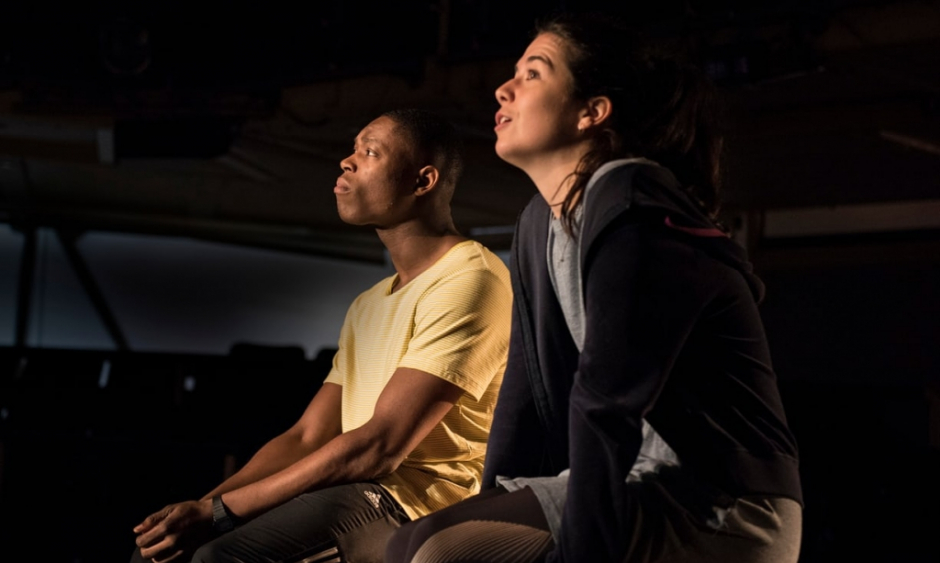Our Town by Thorton Wilder, directed by Sarah Frankcom; Royal Exchange Theatre, 19 September 2017.
First premiered on Broadway back in 1938, Thornton Wilder’s Our Town is a play with a long history of being done wrong – whether that was as a result of overt sentimentalisation (as was the case at its debut), by letting Frank Sinatra add songs (as was the case in 1955) or with the darker elements of the story amplified out of all proportion (as happened with the 1988 revival in New York starring Eric Stoltz).
For the uninitiated, Our Town tells the story of a small American town, in approximate detail, over the course of almost a decade, between 1901-1910. A stage manager (endearingly played by Youssef Kerkour) directs the action, stepping up from amidst a loose arrangement of picnic tables (the entire cast sitting about in everyday dress) to tell us where main street is, where the shops, churches, schools and, eventually, cemetery resides. Gently God-like, he points out Doctor Gibbs returning home from delivering twins. Doctor Gibbs greets Howie Newsome (Chris Jack, amiably pulling along an invisible horse), Joe Crowell (the magnificently named Kenan Vergun) delivering newspapers, eventually his wife, Mrs Gibbs (played by Carla Henry, veteran of such shows as Moving On, Scott & Bailey, Clocking Off and Losing It).
We start to glimpse dynamics: Mrs Gibbs wants to see France, but her husband is too busy and doesn’t make the time. Their daughter Emily, a bright spark at school, helps out the neighbour’s lad George. Gradually, Emily and George develop a romance, and their romance is at the heart of the play. But there is more to Our Town than romance, pretty much from the get-go, thanks to the stage manager, who brings on a Professor (played by Royal Exchange regular Wyllie Longmore) to take us far back into the past, sharing with us an insight into the rock the town was built on. Later, he plunges us a thousand years into the future to imagine how these folk will be remembered, how likely their triumphs and trials are to be forgotten.
But we need to talk about Emily and George some more. Patrick Elue is solid as George, but his placidity allows his co-star, Norah Lopez Holden (making her first appearance at the Exchange) to shine. We meet her as a young girl, chased around the house by her brother; we see her studying, finishing school, getting married; we see her grow up, and her performance is every bit the equal to Nadia Clifford in Sally Cookson’s recent adaptation of Jane Eyre. We’d go further because the role here demands something more – but to get to that, we need to talk about George Saunder’s Booker-nominated debut novel, Lincoln in the Bardo.
What has a play written in 1938 to do with a novel published in 2017 you might ask? Well, for one thing, Saunders has taken almost every opportunity he can to cite the play’s influence on the book. For another…Our Town begins deceptively enough, as we’ve said, but by the time we reach act 3, things have taken a decided and curious turn for the supernatural. We watch actors and actresses enter the stage, barefoot, look about them and take a seat. Gradually the circle of chairs at the stage edge fill. We see characters we recognise from the first two acts; we see people, older people, we think we’ve never seen before. Ah, we realise. These people are dead.
The final drama unfolds: one of the main characters has died (actually several of the characters have died, but one in particular warrants our attention). We see a funeral, mourners gather, leave, return, just as Lincoln gathers, leaves and returns in Lincoln in the Bardo. We hear from the residents of the cemetery (just as we do in Lincoln in the Bardo, although Wilder’s characters remain resolutely people – where Saunders’ dead sprout many eyes, swing about like deranged signposts in the wind, or switch between a fallen bridge, a vulture, a large dog, a terrible hag gorging on black cake, a stand of flood-ravaged corn and an umbrella ripped open by wind). And, just as in Lincoln in the Bardo, things take a violent swing to the strange:
Our newly dead character wishes to return, to see a day from the past once more, to glimpse her mother and father (played by Kelly Hotten and Graeme Hawley, respectively, who get to share a sweet, true moment as a younger couple, glimpse afresh – “How young they both look!”). The day she chooses is a birthday, snow falls as a plinth is lowered from the ceiling adorned with vast sunflowers and birthday presents. A painful and protracted attempt to reach out from beyond the grave fails ad a terrible scream, as shrill and effective as the scream that ended the recent series of Twin Peaks, fills the auditorium. We didn’t see this coming did we?
Dr Gibbs visits the graveyard; later, George visits. Each wear their sorrows heavily. Unfortunately, each leaves the stage too quickly (we can’t help but feel that sorrow treads slowly). Their quick exits are all we can point towards as faults with the production (and these are issues quickly solved – just walk a mite slower, boys).
Our Town is a terrific revival, a show that will make you smile in its first, longer half, that may make you gaze upwards at the stars on your way home, counting the seconds that make up the day, intent perhaps on making the most of what time is available to us all. It’s worth seeing in its own right. For anyone who has read and enjoyed Saunders’ novel, it’s nigh on essential (and the Royal Exchange should have made something of the connection in its programme).

